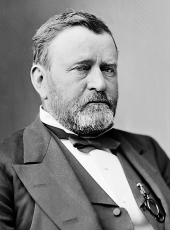A commission of citizens having been appointed under the authority of law to cooperate with the administrative departments in the management of Indian affairs, consisting of William Welsh, of Philadelphia; John V. Farwell, of Chicago; George H. Stuart, of Philadelphia; Robert Campbell, St. Louis; W. E Dodge, New York; E. S. Tobey, Boston; Felix R. Brunot, Pittsburg; Nathan Bishop, New York, and Henry S. Lane, of Indiana, the following regulations will till further directions control the action of said commission and of the Bureau of Indian Affairs in matters coming under their joint supervision:
1. The commission will make its own organization and employ its own clerical assistants, keeping its "necessary expenses of transportation, subsistence, and clerk hire when actually engaged in said service" within the amount appropriated therefor by Congress.
2. The commission shall be furnished with full opportunity to inspect the records of the Indian Office and to obtain full information as to the conduct of all parts of the affairs thereof.
3. They shall have full power to inspect, in person or by subcommittee, the various Indian superintendencies and agencies in the Indian country, to be present at payment of annuities, at consultations or councils with the Indians, and when on the ground to advise superintendents and agents in the performance of their duties.
4. They are authorized to be present, in person or by subcommittee, at purchases of goods for Indian purposes, and inspect said purchases, advising the Commissioner of Indian Affairs in regard thereto.
5. Whenever they shall deem it necessary or advisable that instructions of superintendents or agents be changed or modified, they will communicate such advice through the office of Commissioner of Indian Affairs to the Secretary of the Interior, and in like manner their advice as to changes in modes of purchasing goods or conducting the affairs of the Indian Bureau proper. Complaints against superintendents or agents or other officers will in the same manner be forwarded to the Indian Bureau or Department of the Interior for action.
6. The commission will at their board meetings determine upon the recommendations to be made as to the plans of civilizing or dealing with the Indians, and submit the same for action in the manner above indicated, and all plans involving the expenditure of public money will be acted upon by the Executive or the Secretary of the Interior before expenditure is made under the same.
7. The usual modes of accounting with the Treasury can not be changed, and all expenditures, therefore, must be subject to the approvals now required by law and the regulations of the Treasury Department, and all vouchers must conform to the same laws and requirements and pass through the ordinary channels.
8. All the officers of the Government connected with the Indian service are enjoined to afford every facility and opportunity to said commission and their subcommittees in the performance of their duties, and to give the most respectful heed to their advice within the limits of such officers' positive instructions from their superiors; to allow such commissioners full access to their records and accounts, and to cooperate with them in the most earnest manner to the extent of their proper powers in the general work of civilizing the Indians, protecting them in their legal rights, and stimulating them to become industrious citizens in permanent homes, instead of following a roving and savage life.
9. The commission will keep such records or minutes of their proceedings as may be necessary to afford evidence of their action, and will provide for the manner in which their communications with and advice to the Government shall be made and authenticated.
U. S. GRANT.
Ulysses S. Grant, Executive Order Online by Gerhard Peters and John T. Woolley, The American Presidency Project https://www.presidency.ucsb.edu/node/203703

